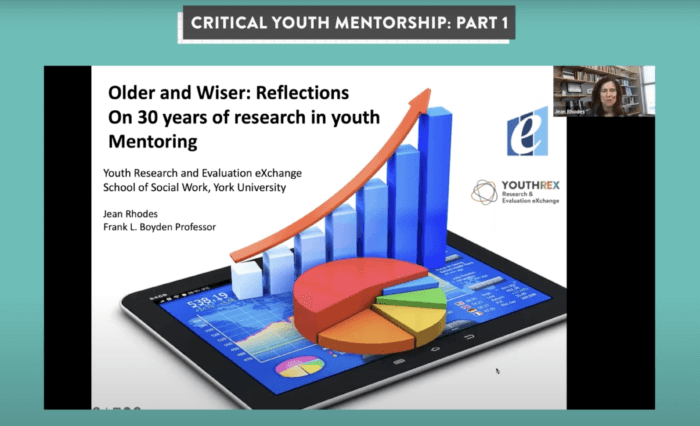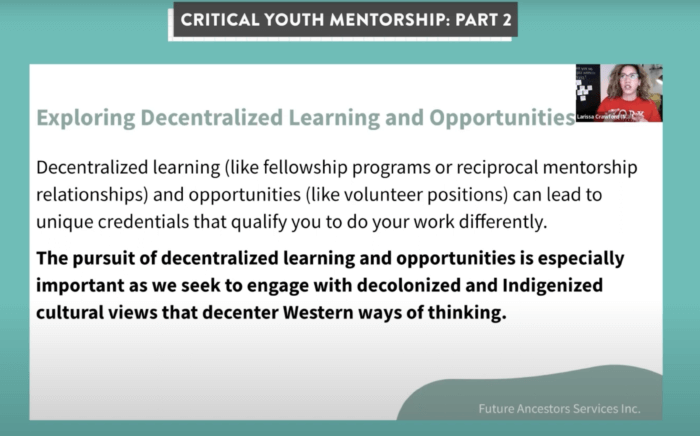Reimagining Critical Mentorship for Equity-Deserving Youth
How can we expand our understanding of youth mentorship in ways that centre the strengths and voices of young people, promote intergenerational and multidirectional learning, and advance social justice? We delved into some of the infinite answers to this question during Critical Youth Mentorship: A Youth Work Teach-In.
This two-part event explored inclusive, equitable, and meaningful approaches to youth mentorship, featuring keynotes by Dr. Jean Rhodes and Larissa Crawford, panels of youth programs sharing critical mentorship practices, and spoken word performances.
Mentoring holds great mutual promise for mentors and mentees in terms of understanding and navigating life’s challenging developmental processes, while promoting healthy relationships, cultivating trust, and supporting personal and career advancement. Critical mentorship is the understanding that traditional mentorship has been unsafe and must reconcile both their colonial histories and the considerable power imbalance between partners.
When mentors position themselves and are engaging in new relationships, opening the space for everyone to name how they want to be treated, according to our keynote speaker Larissa Crawford, prevents misunderstandings and harm. We should be checking ourselves and how colonial oppressive behaviours show up in our work. Reciprocity and relationship-building is more effective than the traditional concepts of helping, and connections based on power. Oftentimes child welfare, the biggest proponent of mentoring, utilizes it as part of the transition plan to push for independence for youth. Rather than perceived liberation, the goal should always be mentoring toward interdependence.
While the teachings were vast and varied, here are four strategies to engage in critical youth mentorship that we found the most beneficial.
1) Incorporate more targeted and evidenced-based methods in response to the small count of effective mentoring programs.
According to 30 years of research presented by Dr. Jean Rhodes, the Director of the Center for Evidence-Based Mentoring, the impacts of mentoring programs were relatively small and were not meeting the immediate needs of youth. Which calls for a re-examination of the structure of youth mentoring programs.

Youth mentors can also help to improve the effectiveness of mentoring programs by taking on a more evidence-based approach and considering mentoring as a workforce development tool. They should consider mentoring as a context for an evidence-based intervention, rather than thinking of mentoring as an intervention on its own. It is important to build a good relationship with mentees and think of them as a friend, but this alone is not sufficient.
Cross-age mentoring is a great example of evidence-based mentoring, as it can be very effective in bringing in overlapping perspectives and backgrounds. Overall, the best outcomes can be achieved when strong relationships are balanced with clear, set goals, as each child has unique needs that mentoring programs can address through screening, recruiting, and using technology. Mentoring programs should begin by asking themselves what they really want to change, then measure this by creating a questionnaire. On top of that, mentors should balance different ways of knowing and be open to them all in order to effect change within their program.
See more: Sudbury Shared Harvest transforms mentorship through gardening
2) Aim to focus on Black and other racialized youth, who may be at a socioeconomic disadvantage and require mentoring services as a result.
It is crucial to account for Black and other racialized youth who often gravitate towards mentoring programs because of the challenges they may be more likely to face, such as incarceration, poverty, and trauma attributed to the systemic racism they experience. In relation to the previous point, evidence-based mentoring should be especially inclusive of youth coming from marginalized communities as they do not experience the same privilege as non-Black or non-racialized youth.
For example, Dr. Jean Rhodes explained that natural mentoring, or youth-initiated mentoring, is actually a very effective intervention since it teaches young people to recruit naturally caring adults that are already in their lives. Thus, privileged youth are able to reach out to adults within their resource intensive networks, which is something that Black youth do not always have access to. So natural mentoring would be beneficial for youth even if they are not facing any particular hardships.
Therefore, youth mentoring programs should try to increase Black or racialized young people’s capacity to find these caring adults in their lives so that they can be supported outside a system of institutionalized racism and receive targeted and evidence-based mentoring catered to their specific needs.

3) Decolonize mentorship by acknowledging the power dynamic between the mentor and mentee based on different lived experiences and worldviews influenced by racism and colonization.
Mentors working with youth need to acknowledge that their understanding of the world could be extremely different from their mentee. This is heavily due to the structure of modern society, and the integrations of the living legacies of colonialism within it. We live and work in social institutions that favour more western ideals. The mentee may have grown up surrounded by cultural influences that go against these ideals and, as a result, have faced racism, backlash, and social isolation.
For example, Larissa Crawford dishinkaashoon discusses how the current euro-western concept of time has been historically used to enforce hyper-productivity for monetary value. However, this is not accurate for all cultures. Many of which prioritize time as a tool for self-care, rest, and wellbeing. These differing views of time go against the colonized standard, and have labeled those who choose to follow their own culture as lazy, poor-valued, and in need of correcting.
Mentors must understand that valuing colonized ideals will create harmful power dynamics with the mentee, and further disregard their cultural background. By acknowledging that their views may be viewed as a “Western norm”, the mentor can approach the mentee in a way that is open-minded and understanding of their values and experiences.
See More: Four Teen Writers Weigh in on Their Experiences with Black Girl’s Magazine
4) Consider your lived experiences as a key component of your mentorship qualification, as it is something your mentee might relate to and value.
Credentials for mentorship are more than just attending workshops and earning certificates. One of the best qualifications for meaningful mentorships are our own lived experiences.
Larissa Crawford dishinkaashoon gave her own take on this, explaining how she was able to attain a position at the Ontario Ministry of Northern Development and Mines. She had used her own life and her personal experiences living as a Black Indigenous woman in our current society, the barriers she had faced, as well as working with people of her identity. This, ultimately, made her a qualified candidate for the position because her experiences were unique to other candidates and could apply a different perspective to policy reviews within the organization.
In the same way that Larissa applied her experiences to her job, mentors can also apply their life experiences to mentorship. The perspectives and knowledge that have been gained over the course of their lives may offer mentees something to relate to and connect with in a way that other mentors cannot. That close connectivity creates a more meaningful and impactful mentoring relationship.
The Teach-In really highlighted our relationship to time, and that mentoring does not have a definitive limit or deadline; rather, it can be focused on creating lifelong meaningful connections. Critical mentoring is not about reclaiming the word mentoring; rather, it seeks to be adaptive, to be both formal and informal, evidence-based, and understanding that lived experience is data in itself. It seeks to be traditional and innovative. It must always look at ways we can engage all youth, and especially Black, Indigenous, and racialized folks, to engage in beneficial, fruitful mentoring relationships.
Watch Part 1 of Critical Youth Mentorship: A Youth Work Teach-In.
Watch Part 2 of Critical Youth Mentorship: A Youth Work Teach-In.

